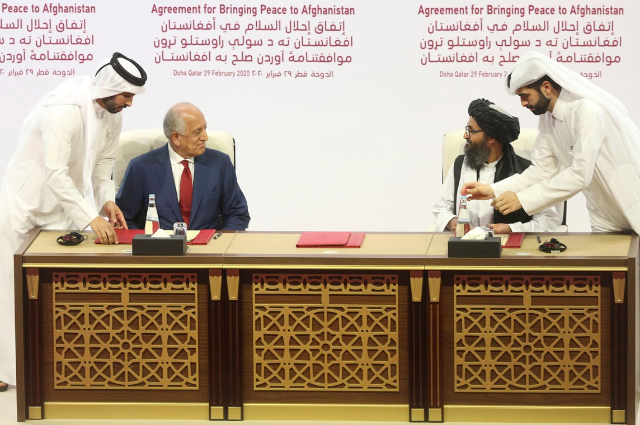
It all started with the 9/11 attacks. Now, after twenty years of rain of carnage, the US have finally made a rather evasive exit from Afghanistan. Does this mean that the country is finally free of its oppressors? To begin with, the roots of Afghan politics have always been intricate. From the year 1996 to the year 2001 when America made its direct entry into the Afghan political scene, Afghanistan was ruled by the Taliban, an Islamist fundamentalist organisation. This "student" group was founded by Mullah Mohammad Omar, a mujahedeen commander during the war between Islamist faction in Afghan and the USSR in the 1980s. Their dominance emerged with the downfall of Soviet-backed President Mohammed Najibullah in 1992. By and by, they gained control of the capital city Kabul and began to impose stringent Islamic rule in the country. It was the Taliban's hesitation to handover Osama bin Laden, the leader of al-Qaeda and the mastermind behind the 9/11 attacks, that prompted the US to invade Afghanistan. However, it is said that Pakistan had a key role in turning the Taliban against the US due to their insatiable greed, something which can never be overlooked. But for now, let us focus on the year 2021 and what it means for the Afghan community and economy.
When the US made its debut in Afghan administration in 2001, they set forth the following objectives — eliminate al-Qaeda, wipe out the Taliban, build Afghan security forces to prevent terrorism from burgeoning in Afghanistan and to reconstruct Afghan economy. The US military forces succeeded in killing Osama bin Laden in 2011. Nevertheless, the US troops continued to stay and over the last twenty years spent over a thousand billion dollars on war as well as reconstruction before finally realising that their mission may turn out to be a futile one. Now that the US have made a face-saving exit, the Taliban are back to administrative position.
The new Taliban government was announced on September 7, 2021 with Mohammad Hassan Akhund as the Prime Minister. Mohammad Yacoub is the defence minister while Sirajuddin Haqqani, leader of the Haqqani network that is designated as a terrorist organization by the US, is the chief of the ministry of interior responsible for internal security. Haqqani was also the head behind terrorist attack on the Indian Embassy in Kabul in 2008. Abdul Ghani Baradar, who represented the Taliban in its negotiations with the US, has been appointed as one of the deputy prime ministers. The Pashtuns have an upper hand in the government as members of the non-Pashtun ethnic groups are thin on the ground. As expected, there is no woman in the cabinet. This new government is expected to wipe out chaos and bring about order in the country.
As soon as the Taliban made its official re-entry, most of the countries, including India, temporarily shut down their embassies in Kabul. The former PM Ashraf Ghani and other ministers have sought refuge in other countries. The people who supported the US-backed government now live under trepidation. Heart-wrenching sights of people fleeing from Afghanistan evidently exhibits the fear of the people. Several countries evacuated their citizens in fear of bloodshed. The Taliban government, during its initial tenure, was infamous for its regressive rule and oppressive interpretation of Islamic laws. Females were banned from attending educational institutions.
But the "new" Taliban has promised to be progressive and obliging. At the same time, they have declared that the country will operate under Sharia law. Even though there is access to uncensored Internet and there has not yet been a ban on television broadcast, the media outlets now work under the guidelines of Taliban. Although the Taliban has stated that schooling for girls will resume shortly, it is too soon to make anything of it. They have also put a full-stop to co-education and it will be mandatory for women to wear hijab. As part of gender segregation in universities, male professors won't be allowed to teach female students. All these will take a toll on the growth in female literacy rates witnessed under the US-backed government. Women have also been banned from playing sports. Thus, initial steps from Taliban seem to contradict their promise.
The new regime is of utmost international concern. India will have to be extremely vigilant as there is a greater probability for extremist groups to sprout with vigour. Even though no country has officially recognised the new government yet, countries like China and Pakistan are open to dialogues with them. Maintaining good relations with Afghanistan is very important for China's Belt and Road Initiative, part of their global ambitions. It is apprehended that the formation of the Taliban government can engender surge in international and regional terrorism, political instability in the region and human rights violation. Western officials demand proof of the Taliban's cutting off ties with al-Qaeda before they can somehow place trust in the new regime. The whole world has to be wary of the Taliban because revoking the Doha Agreement can have serious repercussions globally and particularly in the context of India's social, political, and economic interests and security.
